You don’t need to be a professional to start creating your own music. Thanks to music production software for your PC or Mac, it’s never been easier. They offer a cheap way for you to get your creative juices flowing—no studio required.
Paid professional software is available, but with companies like Apple offering top-quality production software for free, beginners don’t need to invest huge sums just to get started. Here’s a run-through of six of the best free music production software for beginners to try.
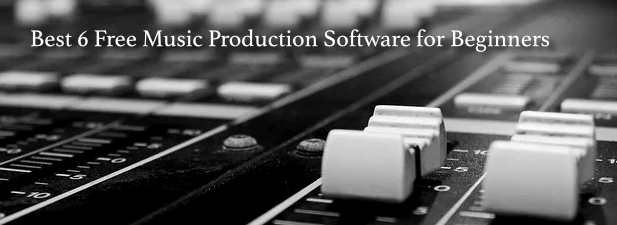
Apple GarageBand for Mac
There’s a reason why, wherever you go, you’ll always see Apple GarageBand for Mac recommended as one of the best, if not the best, free software for music creation. This is thanks to powerful, professional features wrapped up in an easy-to-use interface.
For beginners, there might be a bit of a learning curve with GarageBand, but the effort is worth it. Total beginners can take advantage of the built in-tutorial system, with video tutorials to help you learn a new instrument to use with GarageBand, for instance.
You can use your own instruments with GarageBand or you can create your music using the virtual instruments and effects included within the music production software, where up to 255 separate audio tracks can be mixed together.
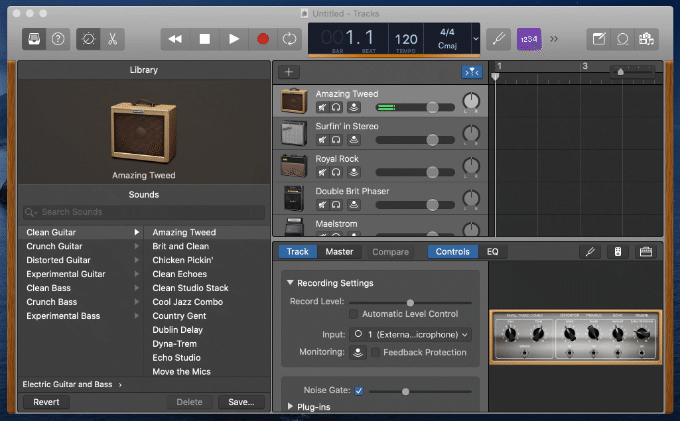
GarageBand can be used to edit other types of audio files, too. That includes podcasts, where support for multiple microphones could prove useful.
It’s quick, it’s powerful, and best of all, GarageBand is free and pre-installed on every Mac computer, ready for you to us. GarageBand is also available as an app in the App Store for iPhone and iPad owners.
As an Apple product, GarageBand is only available on macOS and iOS. Windows and Linux users will need to look at one of the alternatives below.
Audacity
Music creators looking for an alternative to GarageBand should take a look at Audacity. Strictly speaking, Audacity is more an audio editing tool than a full digital audio workstation like some of the other options on our list. You just have to work a little differently to get the most out of it.
Audacity lets you splice up and process any recorded audio in all major audio formats. First and foremost, it’s an audio editor, but you can expand it with effects and plug-ins. You can even create your own plugins for others to use, thanks to the common VST format.
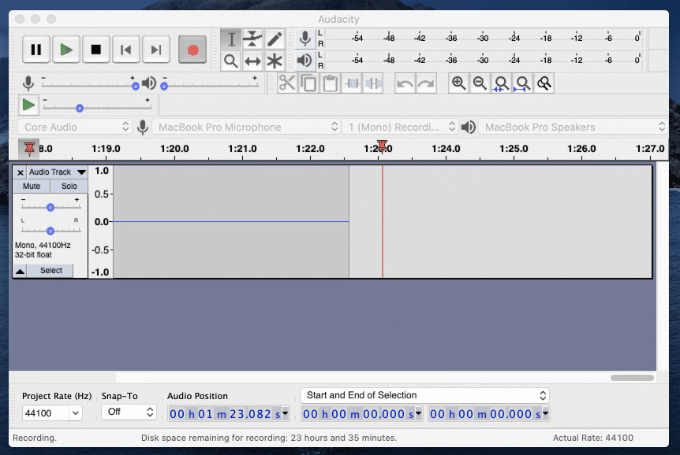
It’s the simplicity that will really appeal to anyone looking to create their own music without years of experience or training. Beginners will love the interface, as it doesn’t overload you with options. You can record straight into the music production software, taking advantage of the powerful editing tools to create music to your taste.
Audacity is cross-platform, so you can switch between Windows, macOS and Linux installations with ease and, as it’s open-source (meaning anyone can help to develop it), it’s totally free to download.
Cakewalk by BandLab
Cakewalk SONAR was one of the earliest digital music creation software available but development stopped in 2017 when the original company shut down. Thanks to the Singapore-based BandLab, the newly-renamed Cakewalk is back in active development and is available for you to download for free on Windows.
Cakewalk is an all-rounder, with songwriting tools, audio editing, sound effects, and a professional-standard mixing engine for crisp, clear audio. Beginners may find the GUI a little challenging, but it can easily be customized, with custom themes and layouts to suit your needs, and a “basic” pre-set layout for new users to try.
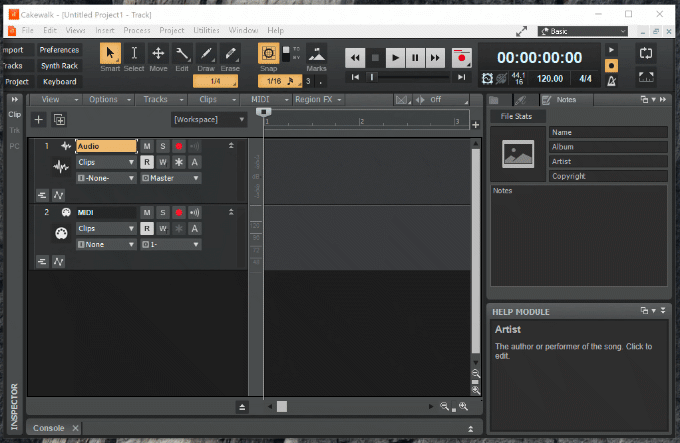
Like GarageBand, Cakewalk includes the ability to use virtual instruments if you don’t have your own. It also allows you to open up video files and edit the audio track, making it a good option for creating and editing your own music videos.
With the ability to publish straight to YouTube, Soundcloud, and Facebook, you don’t need to do anything extra to publish your music. From start to finish, you can craft your music in Cakewalk without needing to touch any other software.
LMMS
A tagline that says “let’s make music” is a powerful statement of intent from LMMS. Originally named the Linux MultiMedia Studio, LMMS is now a cross-platform music creator that you can use on Linux, Windows, and Mac computers. Like Audacity, LMMS is free and open-source.
It has many of the features you’d expect from professional music production software. You can arrange, mix, and edit multiple tracks at once, with support for industry-standard VST audio plugins to expand the number of available effects and virtual instruments.
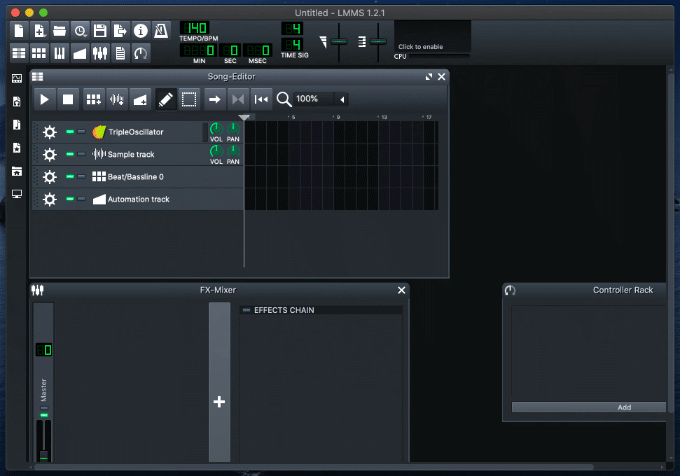
Unlike some of its competitors, LMMS has a simple GUI for beginners to get to grips with, with several custom themes available. One stand-out feature is the LMMS community, where you can share your project files with other users, or customize others for your own needs.
LMMS might not be as polished as Apple GarageBand or Cakewalk, but it’s still a more than adequate option for new music creators.
SoundBridge
If you’ve tried other audio editing software and found them too difficult to use, then give SoundBridge a try. It’s been built with simplicity in mind, with an interface that doesn’t overload with menus, sliders or unnecessary features.
SoundBridge includes support for touchscreen devices and VST audio plug-ins, a customizable drum machine, and a powerful set of audio editing tools to cut, slice and mix multiple tracks at once. SoundBridge also comes with a free collection of sound samples you can integrate into your music.
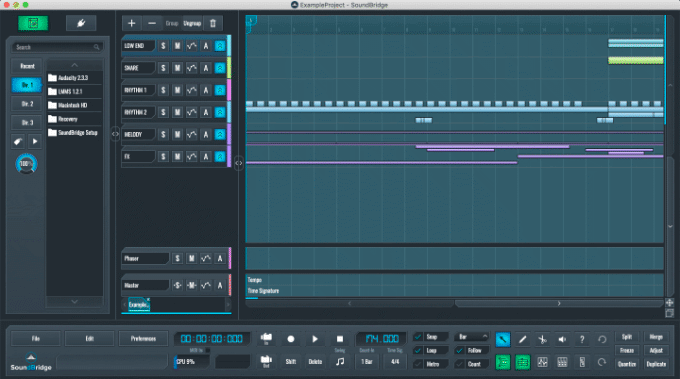
There’s also an academy program with paid and free courses to try, a blog with various how-to guides, and a set of video tutorials to help improve your music production skills further.
SoundBridge is available for download on Windows and Mac but, before you download, we have a single word of warning. You’ll notice a misleading donation notification when you sign up to download. Despite the wording, you don’t need to donate to use SoundBridge on your PC.
Mixx
From GarageBand to SoundBridge, each of the music production software covered in this list can be used, regardless of your own genre of music. Mixx breaks that mold, focusing entirely on creating tracks for DJs.
Mixx’s feature list is packed full of the features you’d expect from professional mixing software for DJs, except for the price—it’s free and open-source.
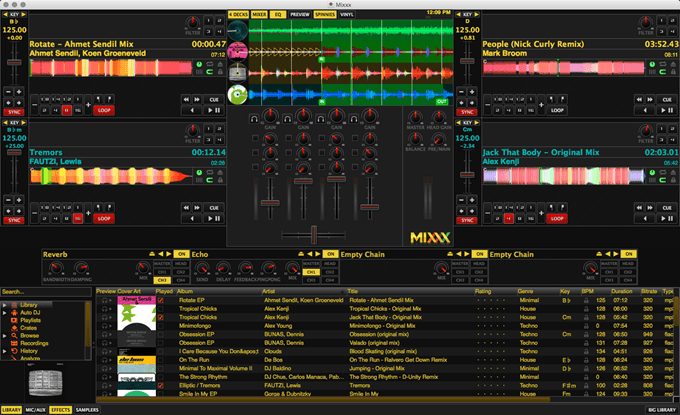
You can load up to 64 different sample decks to mix up your tracks, add custom audio effects, and import your own music database, thanks to iTunes integration. Mixx’s interface is customizable, with custom skins and layouts to suit your own needs.
Mixx comes with support for major hardware controllers and multiple input and output sources. It also includes the ability to stream your music over the internet, thanks to Shoutcast support. If you want to step back for a cup of coffee, you can switch to Mixx’s “Auto DJ” mode, thanks to a set playlist and automatic crossfading.
Mixx is under regular, active development and is available for Windows, Mac, and Linux users to download.